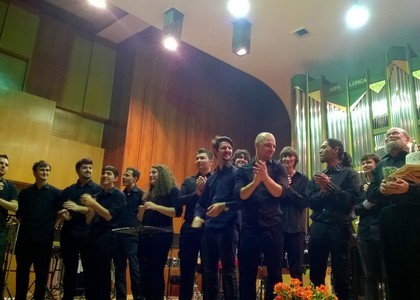> [Archived] Chronicles

'Game' Ensemble - Anniversary Concert at the National University of Music Bucharest
Sorin Rotaru inaugurated the latest instrument acquired by the University, the bass marimba, and played Keiko Abe's Marimba d'Amore. Losa by Emmanuel Séjourné, Uneven Souls by Jovan źivkoviæ and Ionisation by Edgar Varese -were the songs that continued the concert.
The student Irina Rădulescu spoke about being part of this ensemble and of the difficulties of modern and contemporary repertoire: 'I have learned to play in this ensemble and I'm glad to be part of something that was created 20 years ago and I hope to continue its existence from now on. As percussionists, we deal with the contemporary repertoire which adds difficulty. New music is very meticulously written.'
Alexandru Matei, the founder the 'Game' Ensemble, both conductor and musician, talked in the end about promoting new music and also about the mission he has in teaching his young students in the percussion class: 'It means tons of serious work and commitment, great respect for any work, lots of passion and, as I was saying at the beginning of the concert, especially about the young, if I'm able to help them make a long, short and medium term plan from which they won't deviate. Unfortunately, the times we are living make it difficult for a young to anticipate what he will be doing in the next 10, 20 or 30 years; it's very hard, but that doesn't mean it's not possible.'
Translated by Georgiana Ursu and Elena Daniela Radu
MTTLC, The University of Bucharest














